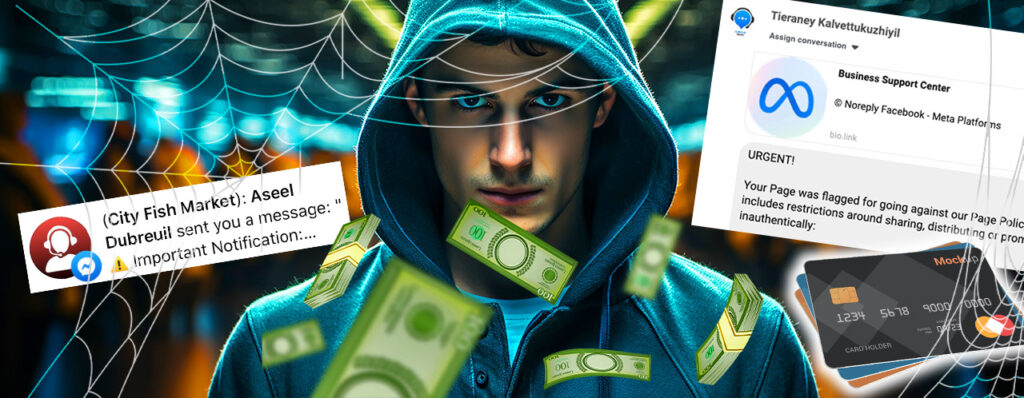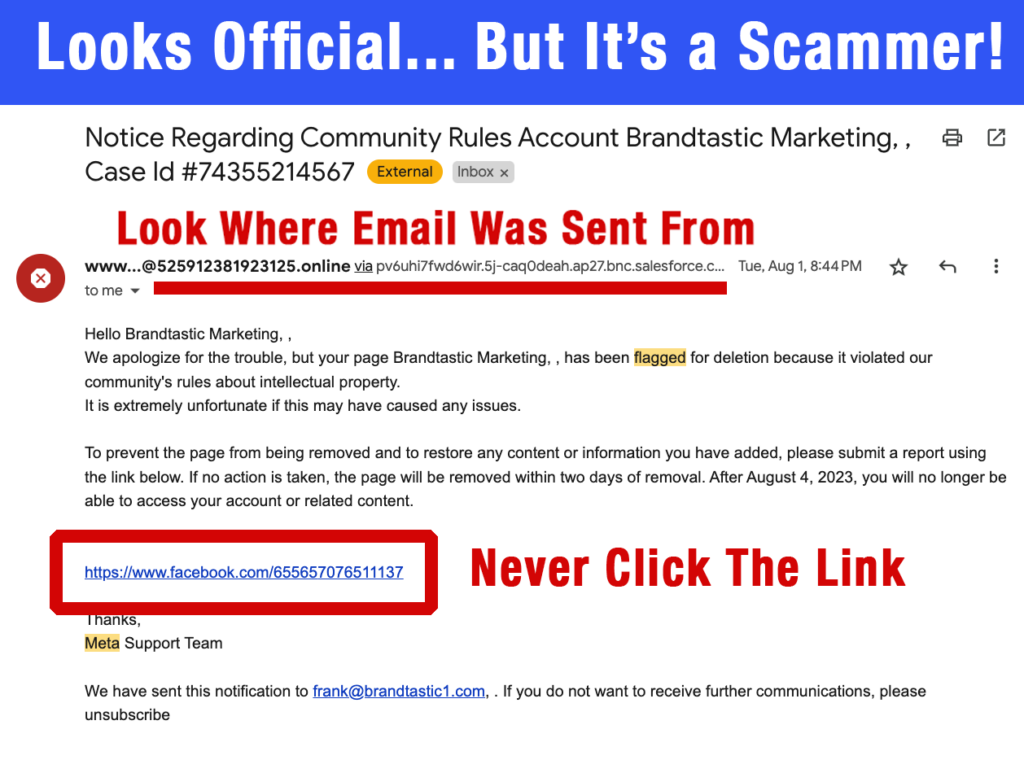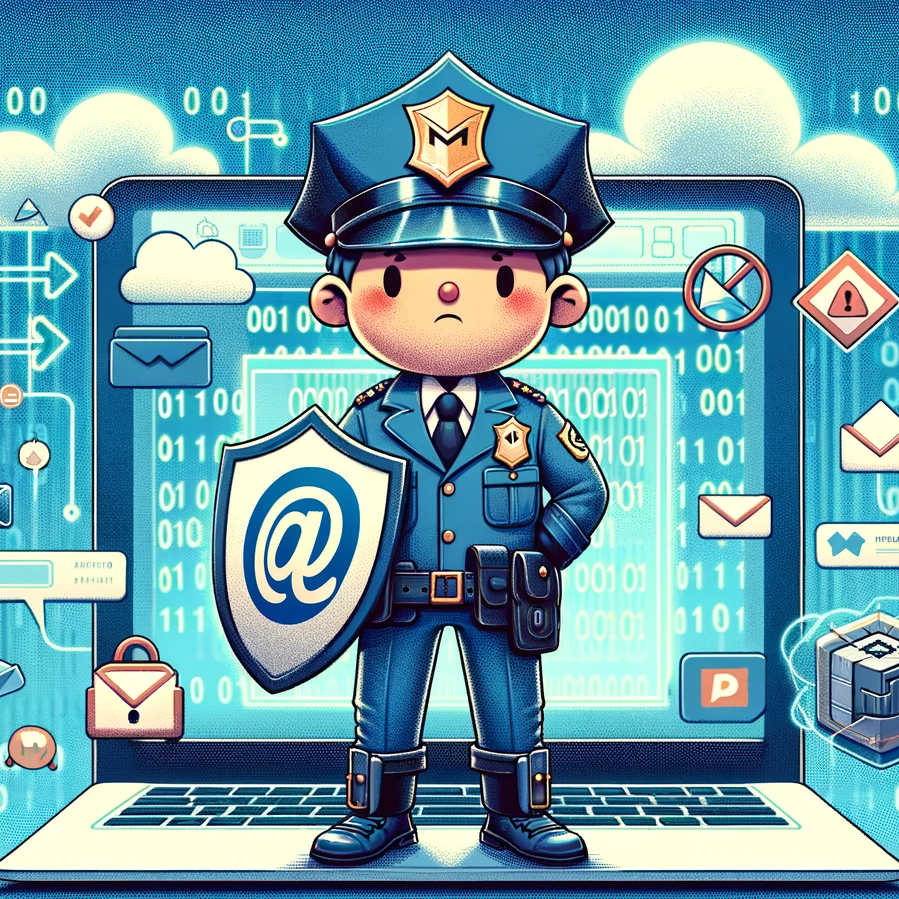
Recognize, Avoid, & Report Meta Phishing Scams
In the age of digital marketing, businesses face an increasing threat from phishing scams, particularly on popular platforms like Facebook and Instagram. Scammers leverage sophisticated techniques to deceive and manipulate, making it essential for business owners and marketers to be vigilant.
 Why Do I Get So Many Meta Scams?
Why Do I Get So Many Meta Scams?
Meta, including Facebook and Instagram, has a vast user base. This makes it an attractive target for scammers looking to cast a wide net. Almost everyone has a Meta account, and most businesses use it to advertise, so getting an email that looks like it comes from Facebook is an easy scam to fall for. The wider the net that scammers can cast, the more clicks they will get. This means that your social media marketing team needs to be vigilant and educated about current scams.
The most common scam you will see is phishing. Phishing is a practice where scammers pose as trustworthy entities, like Meta, to obtain sensitive information. The goal of these attempts is often to take control of your Business and Ad account. When you click the link included in the scam and enter your login information, they will have control over everything! Often scammers will block you from accessing your accounts, steal the payment methods used for Ads, and run scam ads through your ad accounts.
How To Recognize Phishing Scams
Phishing scams are commonly received via emails. More generic phishing scams demand money or offer gifts. The scams seen most commonly as appearing to be from Meta, often threaten account deletion or suspension. Many of these scams will include urgency and pressure tactics. These will include a 24-hour notice or a date your account will be removed. These tactics are trying to induce panic and get you to click on the links included in the emails. Meta will not send you these types of urgent requests.
Scrutinize email addresses for legitimacy, ensuring they come from official domains like facebook.com or fb.com. You can also test hyperlinks by hovering over, but not clicking, the hyperlink to see if the web address it is directed to is different from the web address of the text. Facebook will not send you emails from other domains.
Meta Phishing Emails

Phishing emails will often claim to be from Facebook Security, Business Suite, or the Meta Support team. Make sure you are verifying sender email addresses and scrutinize URLs.
Some of these scams will have spelling and grammatical errors, because most originate from non-English-speaking countries. Scams are always finding ways to look more legitimate, and with tools like OpenAI’s ChatGPT and other AI large language models, grammatical and spelling errors in scams are becoming less common.
Common Meta Scams
The most common Meta scams originate as Facebook Messages and phishing emails. The Facebook messenger scams will use fake accounts that either respond to Ad’s or Facebook Marketplace listings with an “Is this still available” or another preset message. Then when you respond they will send a link or file to download. Do not click on these. Report them to Facebook immediately. They may include the Facebook logo, address, and a link that appears to go to a Facebook login page. This login page is a fake page setup to steal your login information.
How to report Scams
By reporting scams, you are helping to improve the existing anti-scam measures, preventing others from falling for scams, and assisting companies in dismantling scam networks. Report every scam you see, to your email platform, and/or to Meta.
- Follow the facebook Guide for Reporting Scam: https://www.facebook.com/help/1380418588640631
- Forward all suspicious emails to phish@fb.com
- Mark phishing emails as spam
- Block senders in your email
- Block profiles of scammers on Facebook
 Protect Your Business From SPAM
Protect Your Business From SPAM
Implementing robust security measures is crucial for businesses that are using any social media platforms, like Facebook. The first step is setting up two-factor authentication on all your accounts and requiring that all users, admins, and owners on the accounts are all required to have two-factor authentication. This will stop scammers from being able to access your account if someone falls for a phishing email, because they will not be able to get the two-factor code to complete a login attempt.
A great prevention method is to conduct regular employee training on recognizing phishing scams and social engineering tactics. If your team knows what to look for, you are less likely to get caught in a phishing scam. Emphasize using strong, unique passwords and discourage password reuse for anyone who has access to the Business account and do not share passwords! Make sure that everyone who needs access is set up as a user the appropriate way.
Some other tips for prevention are:
- Implement email filtering tools
- Conduct simulated phishing exercises with your team
- Establish clear protocols for official communication
- Stay informed about emerging phishing tactics
 How to Stop Scam Attempts
How to Stop Scam Attempts
The best way to stop scam attempts is by reporting them, taking advantage of security features provided by social media platforms, and using the protection methods above. You can limit some Facebook scams by adjusting your business to only be available in the local area that you serve, or the USA. This will help limit Facebook Messenger attacks that come from other countries.
Phishing scams pose a significant threat to businesses on Meta/Facebook. By staying informed, implementing security best practices, and fostering a security-conscious culture, business owners can protect their enterprises from falling victim to these deceptive practices. Recognize the signs, stay vigilant, and empower your team to navigate the digital landscape safely.
We have decades of digital marketing experience and a dedicated team of professional web designers, content writers, and marketers who live and breathe SEO, Social Media Marketing, and Content Creation. Call Frank Motola today at 813–441–0275 or fill out our online form for a free consultation and let us show you how we can help.



